- Home
- Amanda Flower
Prose and Cons Page 4
Prose and Cons Read online
Page 4
I half-smiled. “I’ve never been one for blood.”
Richard patted me on the arm. “A true humanities professor you are meant to be, then. We struggle with blood and gore, at least outside the literary world.”
With that, Sadie launched into the tale of her ancestor’s tragic death by paper cut, and I felt Rainwater watching me. I willed myself to remain calm. So what if there was a spot of blood on the first line in a story where a man is murdered? In almost every Poe poem or story a man is murdered. Besides, I reminded myself, no one in the room had a glass eye as the victim in “The Tell-Tale Heart” did. I told myself that there was nothing to worry about. Like Anastasia said herself, it was just a stupid paper cut.
Richard cleared his throat, interrupting Sadie’s graphic description. “Now that that’s settled, I believe we should go over the reading schedule for tomorrow.”
“And don’t forget the costumes,” Sadie said, seemingly unconcerned that Richard cut her story short.
The rest of the evening flew by as Richard went over reading assignments for the next day and Sadie handed out the costumes. I accepted my dress, but barely looked at it as I was so distracted by Anastasia’s paper cut. As much as I wanted to convince myself that the cut meant nothing, my intuition continued to nag to the point that I could no longer ignore it.
As the Red Inkers were packing up for the night, I walked over to Anastasia. “Are you sure everything is all right?” I asked her in a low voice.
She threw her garment bag over her arm. “Is this about the paper cut again? Honestly, I have never heard such a fuss made over such a minor injury.”
Emerson meowed at my feet, and I bent over to pick up the small cat. He curved his lithe body around my neck.
“I’m just concerned,” I said. “I happened to overhear the argument you had on the phone earlier this evening, and I thought you might have cut yourself because you were worried about—”
“That conversation is none of your business.” Anastasia’s eyes moved back and forth quickly as if she was looking for something or someone. “I’ll kindly ask you to stay out of my personal affairs.”
Emerson’s warm body vibrated next to my throat.
“I’m sorry to intrude, but—” I paused before plunging in. “I think you might be in some kind of trouble. I’d like to help if I can.”
She wrinkled her nose as if she smelled something foul and that something was me. “I don’t have any idea what you are talking about.”
Faulkner dove from the birch tree and swooped over our heads to his perch by the front window, cawing his favorite phrase as he went.
Anastasia screeched and covered her head.
“Faulkner,” I admonished the bird, for whatever good that would do.
Anastasia licked her lips. “I really have no idea why I keep coming here with these creatures and the complete lack of talent among the other writers—” She stared over my shoulder and stopped abruptly.
When I turned to see what had caught her attention, the only thing there was Faulkner, who was meticulously cleaning his feathers with his long black beak.
She shook her head as if to remove an aberration from her eyes. “It doesn’t matter what I think of this place, does it? I’m just unnerved by the Halloween atmosphere. Aren’t most writers sensitive to their environment?”
“Paranoid,” I said barely above a whisper.
She narrowed her eyes. “I’m not paranoid.”
I winced, not having realized I’d said the word aloud. “I was just thinking of Poe’s story ‘The Tell-Tale Heart.’ Isn’t it truly about paranoia at its core?”
She frowned. “I suppose.” She edged around me and headed for the door. “Good night.”
I inwardly groaned. I had royally messed that up. All I had been trying to do was to warn Anastasia without revealing to her how I might know she was in danger. No one could know about the springwater’s essence and the impact that it had on the books.
“Something wrong?” Rainwater’s deep voice brought me out of my dark thoughts.
I swallowed. “No, everything is fine.” I saw that everyone else had left the shop. The police chief and I were alone.
Faulkner fluffed his feathers and Emerson placed a white paw on my cheek as if to remind me that he was still wrapped around my neck. Okay, we weren’t completely alone.
Rainwater squinted at me until his amber eyes were just slits on his tawny face. “Why don’t I believe you?”
I removed Emerson from my shoulder and set him on the arm of the sofa. “Don’t know.” I shrugged. “I’m very trustworthy.”
He couldn’t fight the smile forming on his lips. “I beg to differ there. I seem to remember you weren’t one hundred percent forthcoming during my murder case last summer.”
I swallowed again, knowing he was referring to Benedict Raisin’s murder. Benedict had been my grandmother’s boyfriend, and because of that, after he was murdered, she was the number one suspect in the crime. I butted into the murder investigation to make sure she wasn’t falsely accused. Chief Rainwater had not been impressed with my detective skills, even though I was the one who’d figured out who the killer was. I didn’t remind him of that fact, since I had nearly gotten killed in the process. I didn’t think it would be a good argument as far as the village police chief was concerned.
“Do you feel ready to read tomorrow?” I asked, changing the conversation to a much more comfortable topic, books. I was always most comfortable talking about literature.
His smile broadened as if he knew all my diversionary tactics. “I’m happy Richard gave me a selection from ‘The Murders in the Rue Morgue.’”
“It only seemed fitting that you would read one of Poe’s great detective stories.”
“‘The mental features discoursed of as the analytical are, in themselves, but little susceptible of analysis,’” he quoted the first line of the story, in an officious tone.
I laughed. “You’re a natural.”
“I love Poe’s work. I think he’s one of the reasons that I went into police work.”
“If that was the case, I’m surprised you’re not a private detective. Poe gave a somewhat bumbling view of police or at least the Paris police.”
His black eyebrows furrowed. “Sometimes being self-employed has its appeal. I could do without the village politics for one.”
Village politics was something I definitely didn’t want to talk about, so I led him to the door. “When are you going to let me read one of your books? All of the Red Inkers, even Anastasia, rave about your work. I feel a little left out.”
“I will. I always keep my promises. It’s just not ready yet. I want it to be the best it can be before you read it, you being a college professor and all.”
I folded my arms. “Richard is a college professor, a full PhD in fact, and you’ve let him read it.”
“I don’t care much about impressing Richard, not like I want to impress you.” He said it so smoothly I would have thought we were discussing the weather.
I felt another chill, but this time it was for a completely different reason from any darn paper cut.
He saved me from responding by saying, “My work is fiction for kids, true, but it’s still a peek into my deepest thoughts. In a way, isn’t that what all writers allow readers when they share their work, a window into another person’s mind? Poe, the tortured soul that he was, was the perfect example.”
“Maybe I should have you visit my freshman comp class. I would love to express that idea to my students and it might be more impactful if coming from a true writer.” I opened the front door.
He laughed. “If I can call myself such a thing.” He hesitated before stepping out onto the porch. “It seems you had a delivery.”
“Really?” I edged around him to find an enormous crate sitting under one of two outside lights
flanking the door. “It’s awfully late for a book delivery,” I mused. “And all the deliverymen know to come to our back door. . . .” I trailed off when I saw the words on the wooden crate: MORTON VINEYARDS.
“There’s a note,” Rainwater said as he bent over and picked up the note. He handed it to me without reading it.
I opened the small envelope and read it silently to myself. “Vi, Best of luck on your Poe-try Reading tomorrow. It would not do for an event associated with the festival not to have wine. I took the liberty of dropping this off for you. Don’t even try to return it. See you in the bushes, N.” My face flushed bright red. Apparently, the duck-and-cover strategy to avoid Nathan had not been as effective as I thought.
I hid the note behind my back as if the police chief had the ability to read through the paper. Considering the other superpowers I suspected he possessed, it wasn’t out of the question. “The mayor sent some wine over for the Poe-try Reading.”
Rainwater’s amber eyes were kind. “I gathered that from the name on the crate. He is a determined suitor, isn’t he?”
“It’s not like that,” I said maybe a little too quickly. “He’s just supporting the shop. He’s always cared about Grandma Daisy and Charming Books.”
Rainwater gave me a sad smile. “I think that’s exactly what it’s like.”
Before I could respond, he walked down the porch steps and through the front gate.
With a groan, I picked up the crate and clumsily carried it inside the shop. It was a crate of ice wine, Morton Vineyards’ most expensive vintage. I knew Rainwater’s estimation of Nathan’s motives was much closer to the mark than mine.
I set the crate on the floor, shut and bolted the door, then leaned my back against it with my eyes closed. My head was swirling over all that had happened that evening: Anastasia’s paper cut, Sadie’s strange behavior, my conversation with Rainwater, and now the crate of wine. When I opened my eyes again, I found Emerson sitting at my feet on a stack of Edgar Allan Poe hardbacks, which hadn’t been there a moment ago.
I banged the back of my head against the heavy antique door in defeat.
FIVE
By late the next morning, worries over Anastasia’s paper cut and Nathan Morton’s wine delivery flew right out of my mind as I bustled in and out of Charming Books helping customers select books from the shop and checking in with the last-minute preparations for the Poe-try Reading. Sunday was always one of the busiest days of the week in the shop as city dwellers gravitated toward Cascade Springs on the weekends, but the business in the shop was even more brisk that day due to the influx of thousands of tourists in our small village for the Food and Wine Festival.
In my grandmother’s prized back garden, a podium and microphone, borrowed from the community college, waited for the reading to begin. The village park with its woods adorned in autumn colors was the perfect backdrop for the reading.
Over the five decades that Grandma Daisy had been at the helm of Charming Books, she had been asked to sell the open acres surrounding the shop countless times. She always refused. When I was a teenager, I had thought she turned the offers down because she wanted to keep the land close to the springs clear of development. That might have been part of it, but I now knew the true reason. The Caretaker needed unobstructed access to the springs at all times to gather water for the tree.
The Poe-try Reading was to begin shortly, and a small crowd was already stopping by the refreshment table to partake of Grandma Daisy’s cupcakes, the cookies from La Crepe Jolie, and Nathan’s wine. Other attendees sat in the four dozen folding chairs we’d set up theater-style in the garden.
Sadie had taken it upon herself to adorn the garden in Poe-appropriate decorations. Pumpkins painted black, silver, and white were sprinkled throughout with arrangements of bloodred chrysanthemums. The color of the flowers brought to mind Anastasia’s paper cut again.
After Chief Rainwater had left the night before, I’d collected the tomes of Poe that the shop clearly wanted me to study and took them to my apartment for the night. I’d flipped through the books, but they didn’t guide me to read anything in particular. I fell asleep believing that the foreboding I had felt over Anastasia had all been in my head. Maybe the books were telling me only to study up for the reading the next day. I was an expert at denial after all.
The final decoration for the reading was Faulkner. We’d moved his perch into the backyard for the event. The crow took to his part as the Raven like a duck to water. I knew he would lord this over Emerson at first chance. At present, Emerson, ever the social butterfly, was weaving his way in and around the rows of tourists. The visitors cooed and admired the cat. He drank up their praise and allowed them to scratch him between his two black ears.
“Violet,” Sadie gasped. “What are you doing? Where’s your dress? You need to change for the reading.”
I peered down at my bookshop sweatshirt and jeans. “I was just about to go up.”
Sadie was already dressed in a pewter gray silk dress with a deep V-neck. Her hair was twisted on the back of her head in an elaborate knot. I wasn’t sure what Poe-esque woman she was going for, maybe Eleonora, but she was beautiful. Her raven black hair was the perfect complement to the dress. I doubted that my strawberry blond waves were what Poe had envisioned when crafting his stories.
“Is everyone else here?” I scanned the crowd looking for the other Red Inkers. Richard was at the podium in a black suit with a white gauzy tie wrapped around his throat. Usually clean-shaven, he had grown a mustache for the reading. He looked like he had stepped out of the pages of a Nathaniel Hawthorne novel, which I supposed for the majority of our guests was close enough to Poe.
Trudy sat in the front row, wearing a blue-and-white-pin-striped dress with puffed sleeves and a white straw hat decorated with matching flowers. “Hey, why does Trudy’s dress have color, while mine is black?” I asked.
Sadie giggled. “Because Trudy refuses to wear black even in the name of Poe. She claims it’s morbid, and because that was the only time-period-appropriate dress that wasn’t black in her size.”
“I’m going to look like a corpse.”
“Don’t be silly. The black will complement your red gold hair and pale skin. You’ll look like Poe’s Ligeia herself.”
I groaned. “That’s just the impression I want to give: murdering ghost. I—” Whatever I was going to say next was cut short by the arrival of David Rainwater. The police chief wore a tweed suit and held a bowler hat in his hand. He carried himself with the assurance of C. Auguste Dupin himself, but unlike with Richard, no one would mistake the police chief for a nineteenth-century poet, and it wasn’t just his ethnicity.
“What are you looking at?” Sadie asked as she followed my gaze. “Oh,” she said, her mouth making a little O shape as she said it. “But what about Nathan?”
I blinked at the mention of the mayor’s name. “What about Nathan?”
“You can’t be making goo-goo eyes at another man when you are supposed to be dating Nathan.” She folded her arms as if she was preparing to pout.
“First of all, I wasn’t making goo-goo eyes at David. I was appreciating the outfit you picked out for him. That bowler hat is amazing.”
She snorted.
A little more loudly, I said, “Second of all, Nathan and I are not dating. I can barely call us friends.”
“But the wine?” she asked. “Grant told me Nathan gave it to you as a gift.”
“Nathan gave it to Charming Books as a gift, not to me personally,” I corrected. “You know that he cares about Grandma Daisy.”
She rolled her large blue eyes. “While you were away for the last decade plus, Nathan never donated a whole case of ice wine to Charming Books. Now you’re back and here’s the wine,” she said as if somehow that rested her case. Part of me was afraid that it had. “Besides, you have to date him,” she went on. “You’re p
erfect for each other. Everyone knows that. I’ve seen your yearbook pictures. You two were the golden couple of the village when you were in high school until . . .” She trailed off.
I sighed. Until my best friend, Colleen, died in a senseless accident and our lives were torn apart. Nathan stayed in the village after that. I fled, vowing never to return. I would have kept that vow if my own grandmother hadn’t tricked me into returning with some made-up story that she was dying. Once she got me here, she revealed my destiny as the Caretaker and convinced me to stay. I didn’t repeat any of these thoughts to Sadie; she knew the story except for the Caretaker piece—only Grandma Daisy and I knew that.
“And,” she said even more earnestly, “you can’t leave me to fend for myself against the elder Mortons. I need backup.”
There was the real reason that Sadie wanted me to date Nathan. She was engaged to his younger brother, Grant. Nathan and Grant’s parents could be . . . difficult. They were overachievers who assumed their sons should be the same way, and when the boys fell short, the elder Mortons did not hold back their criticism.
Grant Morton had more than fallen short of his parents’ dreams for his life. His mistakes and greed had almost landed him in jail. Sadie and Grant had postponed their wedding after the events of the summer, when Grant was caught in an embezzling scheme that had put the town’s natural springwater at risk. The only way that Grant got off so easy was by giving up his coconspirators.
Against everyone’s advice Sadie stood by her man through the whole ordeal, and according to Sadie, the couple was “taking time to work on their relationship.” Now Grant was back working at the family winery and trying to pull his life together. I didn’t begrudge him that, but I would have felt a lot better about the whole thing if Sadie had broken it off with him completely. I’d known Grant since we were kids and he always schemed to get ahead, from cheating on tests to organizing a smear campaign against anyone who even considered running against him for student council. It was difficult for me to believe he would completely change his wily ways after a few nights in jail, and I didn’t want him to take sweet Sadie down with him.

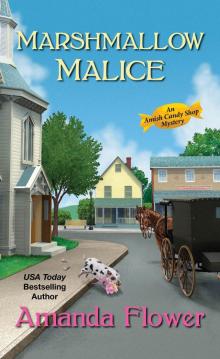 Marshmallow Malice
Marshmallow Malice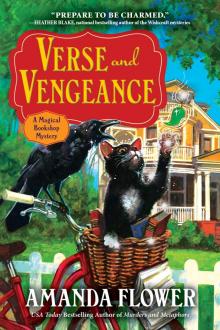 Verse and Vengeance
Verse and Vengeance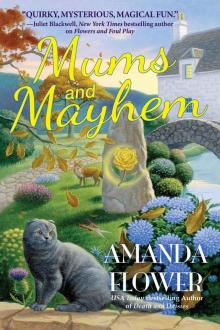 Mums and Mayhem
Mums and Mayhem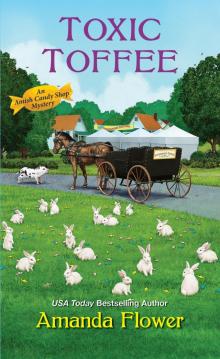 Toxic Toffee
Toxic Toffee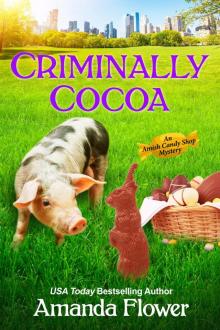 Criminally Cocoa
Criminally Cocoa Assaulted Caramel
Assaulted Caramel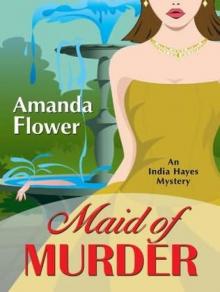 Maid of Murder aihm-1
Maid of Murder aihm-1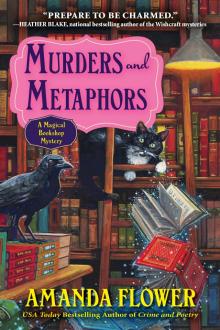 Murders and Metaphors
Murders and Metaphors Matchmaking Can Be Murder
Matchmaking Can Be Murder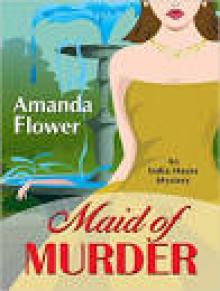 Maid of Murder (An India Hayes Mystery)
Maid of Murder (An India Hayes Mystery)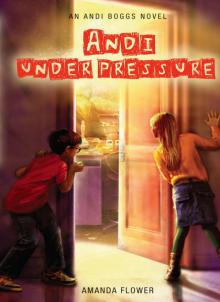 Andi Under Pressure
Andi Under Pressure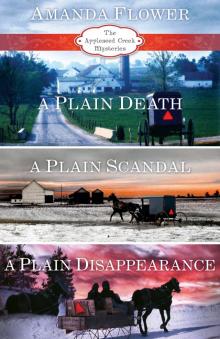 Appleseed Creek Trilogy, Books 1-3
Appleseed Creek Trilogy, Books 1-3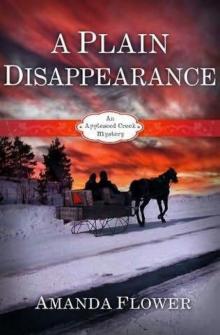 A Plain Disappearance
A Plain Disappearance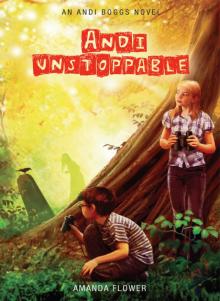 Andi Unstoppable
Andi Unstoppable The Final Vow
The Final Vow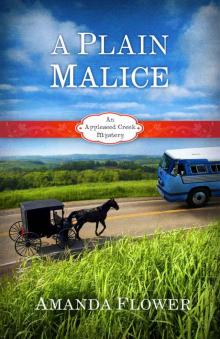 A Plain Malice: An Appleseed Creek Mystery (Appleseed Creek Mystery Series Book 4)
A Plain Malice: An Appleseed Creek Mystery (Appleseed Creek Mystery Series Book 4)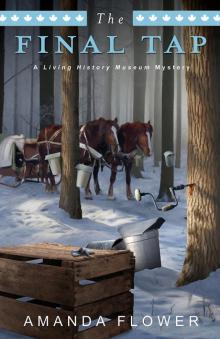 The Final Tap
The Final Tap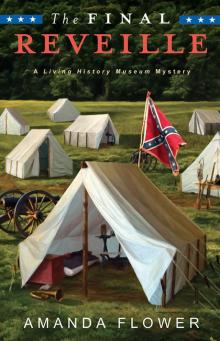 The Final Reveille: A Living History Museum Mystery
The Final Reveille: A Living History Museum Mystery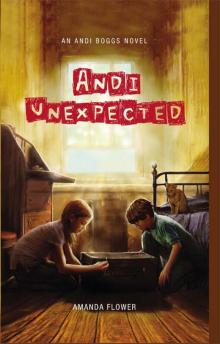 Andi Unexpected
Andi Unexpected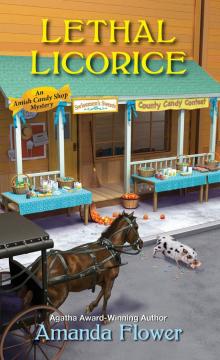 Lethal Licorice
Lethal Licorice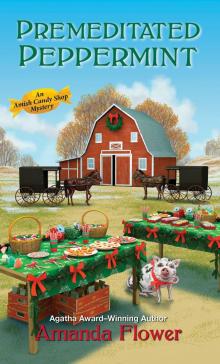 Premeditated Peppermint
Premeditated Peppermint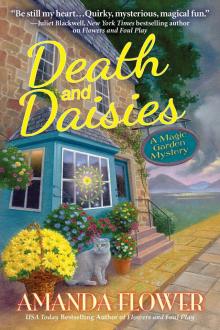 Death and Daisies
Death and Daisies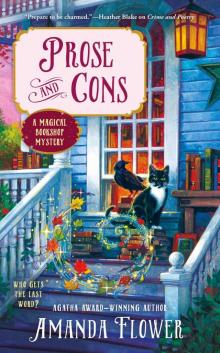 Prose and Cons
Prose and Cons